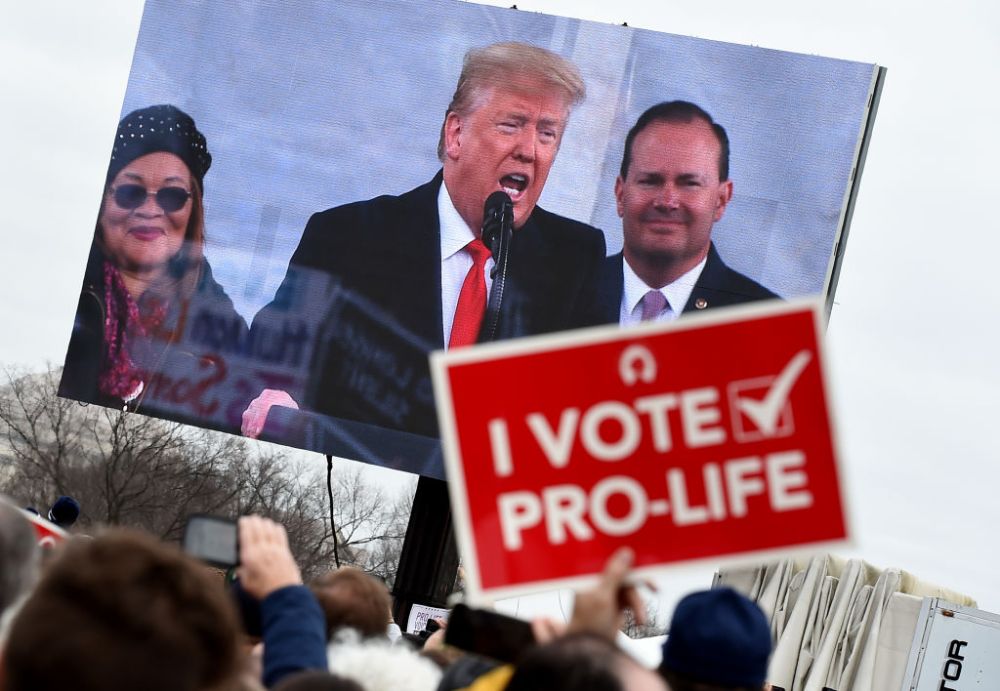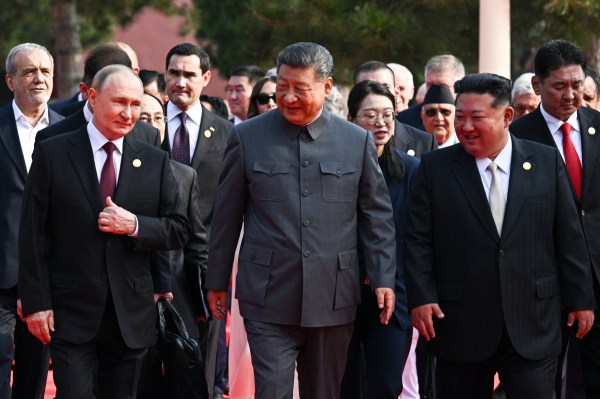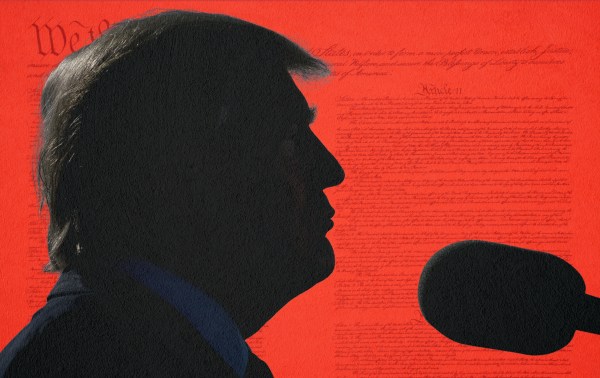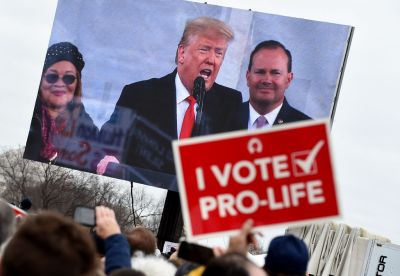Who could have guessed that the greatest modern Republican champion of federalism would be Donald Trump?
Strongmen aren’t normally sticklers for principles that require them to cede authority to less exalted government entities. When riots broke out in 2020 during the wave of Black Lives Matter protests, Trump threatened to send in the troops if local authorities didn’t respond aggressively enough to his liking. Months earlier, he claimed that the decision to lift state lockdown orders belonged to him as president, not to America’s governors. Only after his legal advisers quietly corrected him did he allow that states would be “calling their own shots.”
Authoritarians seek to consolidate power. Federalism seeks to disperse it, believing that most governing authority in America properly belongs to the states. It’s a classically liberal hedge against autocracy, inimical to the kind of big-government nationalism favored by Trump and his populist minions.
But recent developments appear to have bred a Strange New Respect for it in the former guy.
This week the Washington Post asked Trump’s campaign for comment on the subject of last Friday’s newsletter, how rifts have begun to open within the Republican Party on regulating abortion. Would a second Trump term remain true to form, with the president and his party attempting to dictate policy to the states on what’s supposed to be a matter for local governments?
Why, no. “President Donald J. Trump believes that the Supreme Court, led by the three Justices which he supported, got it right when they ruled this is an issue that should be decided at the State level,” his spokesman told the Post. Reportedly, when his staff has broached the topic of national restrictions with him privately, Trump has responded tersely with “states’ rights.”
We’re all federalists now!
Well … no, not quite all, as we’re about to see. And that’s a problem for Trump and the rest of the Republican presidential field.
His newfound regard for federalism has nothing to do with principle, needless to say, and everything to do with the knotty politics of this issue.
The Post’s piece began with a startling statistic circulated by Kellyanne Conway to Republican donors: “Eighty percent of voters disagreed with the Supreme Court’s ruling in Dobbs v. Jackson last year overturning Roe v. Wade.” The party watched with horror last November as its candidates grossly underperformed midterm expectations, particularly in swing states like Michigan where abortion was on the ballot. A few weeks ago it recoiled again when the Wisconsin Supreme Court election, which had become something of a referendum on abortion, produced a Democratic landslide in what’s supposed to be a 50/50 state.
Last year a Gallup poll taken after Dobbs found the percentage of Americans who identify as “pro-choice” at its highest point since 1995. A new Wall Street Journal poll published this morning warned that six-week abortion bans of the sort just signed into law in Florida by Ron DeSantis are “overwhelmingly popular with Republicans but opposed by 53% of voters overall, including 64% of white suburban women, a coveted swing group.”
Trump wants no part of this issue ahead of the 2024 presidential election, understandably. And so the authoritarian has magically awakened to the glory of federalism, opting to hand the hot potato of abortion off to the states.
It’s not going over great with pro-life leaders.
Marjorie Dannenfelser, the president of Susan B. Anthony Pro-Life America, saw the comments from Trump’s spokesman in the Post. Quote:
President Trump’s assertion that the Supreme Court returned the issue of abortion solely to the states is a completely inaccurate reading of the Dobbs decision and is a morally indefensible position for a self-proclaimed pro-life presidential candidate to hold. Life is a matter of human rights, not states’ rights. Saying that the issue should only be decided at the states is an endorsement of abortion up until the moment of birth, even brutal late-term abortions in states like California, Illinois, New York and New Jersey. The only way to save these children is through federal protections, such as a 15-week federal minimum standard when the unborn child can feel excruciating pain.
We will oppose any presidential candidate who refuses to embrace at a minimum a 15-week national standard to stop painful late-term abortions while allowing states to enact further protections.
It’s not every day you see a major right-wing group threaten Trump. Lila Rose of Live Action was even blunter:
Jon Schweppe, the policy director of the American Principles Project, was blunt as well:
Students for Life President Kristan Hawkins told the Post that abortion opponents noticed when Trump declined to mention the topic during his 2024 announcement speech or at a retreat with Republican donors last weekend. “His silence spoke very loudly to the pro-life movement,” she said, adding that a Republican presidential candidate insisting on a federalist approach to abortion “is almost a guarantee that they’re not going to advance out of the primary.”
In an era when most right-wing outfits stand ready and willing to subordinate their respective missions to the grand cause of reelecting Donald Trump, it’s inspiring to see leaders of one activist niche prioritize the cause to which they’re devoted over his personal lust for power.
And not just any niche. If rank-and-file social conservatives come to believe en masse that the libertine playboy from Manhattan with whom they made a Faustian bargain in 2016 might no longer be willing to deliver for them on abortion, millions of primary votes are suddenly in play. For the first time, the Republican Party’s immovable object might face an irresistible force from his right, the pro-life movement.
Which, of course, is why Ron DeSantis signed a six-week ban in Florida recently despite the awful polling on abortion for Republicans.
DeSantis’ One Neat Trick as a politician is outflanking Trump to his right wherever possible, believing that outpandering him on issues that animate the Republican base is the secret to finally breaking his hold on the party. That strategy just might pay off. When asked by the Post what she thought of Florida’s new abortion law, Hawkins gushed. “There is a lot of excitement around Governor DeSantis,” she said. The new guy proved that he has “chops to back up his claims that he is pro-life.”
Suddenly you can see a trajectory in which the primary doesn’t end well for Trump. Terrified of further alienating swing voters, he stubbornly sticks to his position that abortion is a matter for the states to regulate. DeSantis sees his opportunity and pounces, loudly endorsing a 15-week federal ban and attacking Trump for being unwilling to “fight” for the base on the ultimate culture-war flashpoint. Evangelical voters begin to shift toward the governor. Trump panics and tries to make amends by endorsing a 15-week ban belatedly, but his lack of conviction on the subject is glaring. The romance with evangelicals is over. Soon, so is his political career.
Backing a 15-week ban would probably hurt DeSantis in the general election but he might be willing to trade “electability” points against Biden to improve his longshot chances of defeating Trump in the primary. (In the Journal poll mentioned above, DeSantis leads Biden by 3 points nationally while Trump trails by 3.) Trump doesn’t have the same luxury. Because he’s favored for the nomination but an underdog for the presidency, he might be willing to sacrifice a few percentage points in the Republican primary by sticking to his “states’ rights” position on abortion in order to make himself more appealing to undecideds in the general election.
What if he miscalculates and it’s not “a few” points he ends up shedding to DeSantis but a dozen or more?
The irresistible force could finally dislodge the immovable object.
There’s, uh, another scenario, though.
The first problem with imagining DeSantis surfing to the nomination on a wave of pro-life sentiment is that, for the moment, his position on national abortion restrictions appears to be … the same as Trump’s.
Last week the governor met privately in New Hampshire with a small group of activists and was asked how the GOP can reach out to moderate voters on abortion. “DeSantis answered by saying that abortion is an issue that is now in the purview of the states, according to five participants who were in the room, and he acknowledged that what resonates in Iowa may not resonate in New Hampshire,” the Post reported.
States’ rights. Sounds familiar.
It’s nice to see that the governor momentarily retains a conservative fondness for federalism despite his new incarnation as a populist bruiser. I suspect that the harsh criticism of Trump by pro-life leaders will lead DeSantis to pivot toward endorsing a 15-week national ban, at least, to woo them.
But it’s inauspicious that he didn’t see that opening in advance. Or, if he did, that he was too timid to seize it.
Which brings us to the second problem. There’s destined to be a bidding war among the Republican candidates in pandering to pro-lifers and it seems unlikely to me that DeSantis can win it. There is, after all, almost certain to be at least one diehard pro-life politician in the field willing to outbid everyone.
That would be Mike Pence, who has yet to sound a note of restraint about restricting abortion at the federal level when asked about the subject over the past year. Last summer, shortly after the Dobbs ruling, he warned that the right “must not rest and must not relent until the sanctity of life is restored to the center of American law in every state in the land.” A few months later he opened the door to federal restrictions when he told RealClearPolitics that he welcomes “any and all efforts to advance the cause of life in state capitals or in the nation’s capital.” In November 2022 he affirmed that he would have voted for Lindsey Graham’s federal legislation to ban abortion after 15 weeks. A few days ago he called for pulling the abortifacient mifepristone off the market.
Pence is doubtless aware of the dismal polling on that subject but, as a very long longshot in the primary, he doesn’t need to worry (yet) about his general election chances the way Trump and DeSantis do. He can afford to stake out a maximalist position on restricting abortion and hope that it wows ardent pro-lifers who are DeSantis-curious, luring them away from the governor. If anyone onstage at a Republican primary debate is apt to call for a total national ban and/or to endorse ending the filibuster to move such a ban through the Senate, it’s the former VP.
The ironic result: By cannibalizing some of DeSantis’ anti-abortion support, Pence will end up making it easier for the least restrictive candidate, Donald Trump, to prevail.
And that brings us to the third problem. When an irresistible force collides with an immovable object, it’s not a given that the object will yield. The force might erode upon contact. I have no doubt that Marjorie Dannenfelser, Lila Rose, and Kristan Hawkins would choose the pro-life cause over Trump if it came to that, but I have serious doubts that many members of their organizations would follow their lead.
So does Matthew Continetti. The American right has remade its beliefs in myriad ways to accommodate Trump’s leadership, he writes. Why would it draw the line at abortion?
What would it mean if Trump, the Republican presidential frontrunner, opposes federal abortion restrictions, or runs against the pro-life wing of his party? Which force would prove more powerful—Trump’s personality or institutional tradition?
I think we know the answer. Trump has modified the GOP before. And there is nothing written in stone that says the Republican Party must be pro-life. When Roe was decided, George H.W. Bush and Gerald Ford were ambivalent about abortion. First Lady Betty Ford was outspokenly pro-choice. It wasn’t until 1980 that the Republican platform became firmly pro-life.
That commitment lasted for more than 40 years. In 2020, however, there was no GOP platform. And if Trump is the nominee, there probably won’t be one in 2024. Donald Trump is the platform. He’s what you’re going to get if you vote Republican.
Reading that reminded me of the famous poll showing how white evangelicals’ views of the importance of character in politicians devolved in the last decade. In 2011, just 30 percent of that cohort said an elected official who behaves immorally in their private life can be trusted to behave ethically and fulfill their duties in public office. On the eve of the 2016 election, with Trump as their standard-bearer, 72 percent said so. In the span of five years, white evangelicals went from being the group least likely among those tested to tolerate poor character in their leaders to the most likely.
That’s the “Trump effect” on the American right. If your beliefs conflict with his political needs, change your beliefs.
As a case in point, this week Dallas megachurch pastor Robert Jeffress told Reuters that he’d moved from undecided earlier in the primary back into Trump’s camp. When asked why, he said of DeSantis, “There is nothing he has done lately to sway evangelicals.” Nothing … apart from signing a politically risky six-week ban on abortion? In a separate interview with Politico, Jeffress mused that “evangelicals support Trump because of his policies. He doesn’t pretend to be pious, which is refreshing.” No other politician in America would be complimented by a Christian pastor for his dearth of piety, but that’s the “Trump effect” for you. His political needs require evangelicals to treat impiety as a sort of virtue. And so now some do.
Mike Pence is partly to blame for that too. McKay Coppins noted recently that by joining the ticket in 2016 Pence created “a permission structure for [Christian] voters to excuse Trump’s defective character and flouting of religious values.” They learned their lesson so well that Trump’s putrid sociopathy is no longer a meaningful liability among them, even with upstanding figures like Pence himself on the primary ballot in 2024 as alternatives. “In effect, [Pence] spent four years convincing conservative Christian voters that the very thing he had to offer them didn’t matter,” Coppins writes.
If evangelicals could change their outlook on the value of basic morality to smooth Trump’s path to power the first time, why wouldn’t they change their outlook on abortion—just a little—to smooth his path a second time? Trump delivered the end of Roe; he hasn’t condemned restrictive state bans like Florida’s. All he wants from his cultists is a bit of legislative leeway on “rape, incest, life of the mother” exceptions and their tacit agreement that abortion should be regulated by the states, not the federal government, even if that means hundreds of thousands more babies killed every year.
That’s the approach that will maximize the Republican Party’s chances of reclaiming power in 2024. And isn’t political power the highest priority of evangelicals after all?
If I had to bet, I’d wager that come 2024 Marjorie Dannenfelser, Lila Rose, and Kristan Hawkins will have had their political influence diminish more so than Donald Trump’s has.
Which is not to say that I expect his “states’ rights” position to abide through the general election. Even a triumphant immovable object like Trump will need to pay some respect to the irresistible force of the pro-life movement, particularly with his primary opponents competing to outflank him on restrictions. My guess is that the 15-week federal ban Dannenfelser says she’s willing to tolerate will end up as the GOP’s “goldilocks” position, the sort of minimum concession to devout abortion opponents that swing voters might find tolerable.
RNC chief Ronna McDaniel has already (sort of) endorsed it, as has the second-ranking Republican in the Senate, John Thune. At least one Senate Democrat says she’d be willing to consider a 20-week ban as part of a compromise on abortion access, making that a potential starting point for negotiations. If nothing else, given the polling, a 15-week ban is firm political ground on which Republicans might make a stand and turn the focus toward Democrats’ own pro-choice extremism.
Pro-lifers will like that aspect of it, at least. They might even tell themselves that a 15-week law is much-needed incremental progress toward the ultimate goal of a total national ban, however absurdly unrealistic that might be. As it turns out, 94 percent of abortions happen in the first 15 weeks, so the GOP’s new federal restrictions would end up restricting not very much at all. But that’s the most abortion opponents are likely to get.
To get more, they’d need to be willing to withhold their votes from their party. I refer you again to the “Trump effect” described above to gauge the likelihood of that.
One way or another, the end of Dobbs might be seen in time as the end of the pro-life movement as a dominant Republican faction. Your move, Donald.







Please note that we at The Dispatch hold ourselves, our work, and our commenters to a higher standard than other places on the internet. We welcome comments that foster genuine debate or discussion—including comments critical of us or our work—but responses that include ad hominem attacks on fellow Dispatch members or are intended to stoke fear and anger may be moderated.
With your membership, you only have the ability to comment on The Morning Dispatch articles. Consider upgrading to join the conversation everywhere.